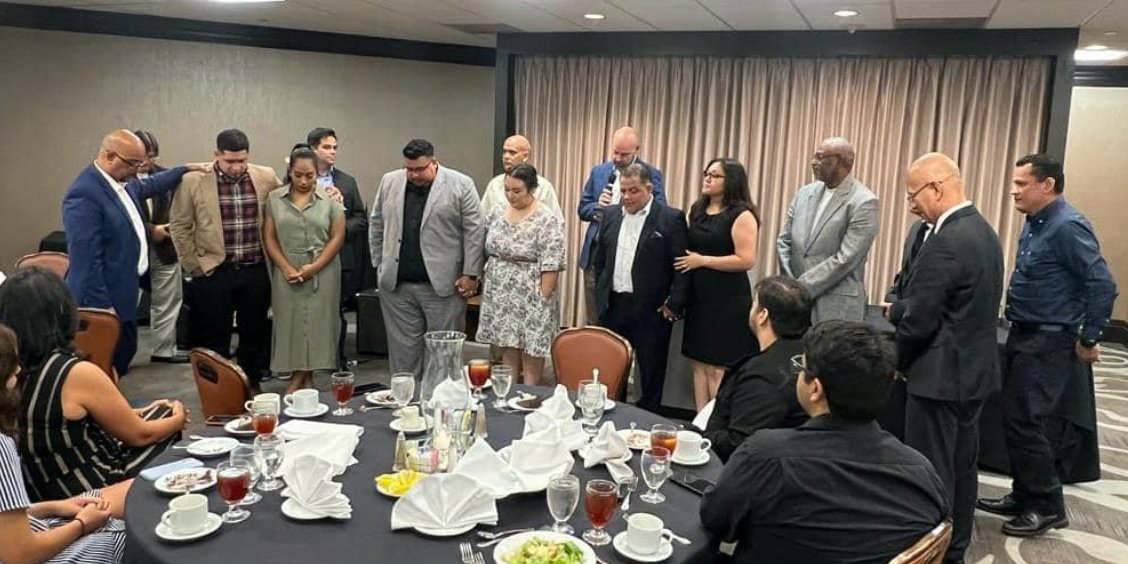How Poor Communication Skills are Hurting Your Gospel Witness
I don't get a lot of uninterrupted focus time these days. So, when I recently had a baby-free afternoon to think, plan, and write, I was especially excited. That is until a stranger set up shop next to me. At first, I was happy to connect with this fellow believer who shared a lot in common with me. I love talking to people—sometimes especially to strangers.
However, the conversation quickly turned into what I can only describe as her aggressively talking at me. After almost an hour and several not-so-subtle cues, my patience and afternoon were spent. I struggled not to be frustrated as I returned home with nothing to show for my time except questions about how the conversation went so wrong.
As I drove home, I couldn't help but wonder: does this sister share the gospel the same way? Admittedly, I had a bad attitude, but she also could work on her communication skills. The gospel may be a stumbling block, but the way we share it shouldn't be. With that in mind, here are just a few strategies to help you be an effective communicator and better gospel witness.
1. Listen to what others are actually saying—not what you expect them to say.
Assuming gets us into a lot of trouble. Especially with such a diverse and rapidly changing culture, it is difficult to know what most people think about any number of things. We often think that commonalities mean that others think like we do, but that's not always true.
“Yes, souls are on the line in a gospel encounter, but I don’t know anyone who’s been annoyed into following Jesus.”
The opposite was true with my coffee shop friend. On almost every point she was making, we agreed. But she was too busy trying to prove her point to notice. As I responded, she was already in combat mode, ready to dismantle me piece by piece.
So she did.
I find a similar danger with rigid and scripted gospel or apologetic presentations. If we're not careful, a combative stance can alienate people who might otherwise be interested in what we're saying. There are only so many misunderstandings a person can take before they simply check out of your conversation.
2. Be humble, not aggressive.
Just because you have the right answers for salvation doesn't mean you're right about everything. That includes theology. Being willing to admit your limitations will make you a much more enjoyable person to talk to and likely take you further into a real gospel conversation.
Recently, I asked a new friend about her beliefs—or lack thereof. She had grown up in the church, walked away as a teenager, and was now unsure if we could be certain about anything spiritual.
When she asked me what I believed, I unapologetically shared the gospel with her. I also told her that there are plenty of "third-tier" beliefs I have that I'm not certain about. In fact, I'm more certain I'll be wrong about at least a few things when I meet Jesus. What is most important is that we don't give up on seeking the Truth—and I have solid reasons to believe that's Jesus and found in the Bible.
She visibly relaxed, and we continued deeper into a lovely discussion about Jesus, truth, and the journey of faith.
Remember: You're not God, but you do have access to His Word. So, if you want to be sure you're right, hang your hat on what the Bible actually says. Be willing to look critically at everything else. Not every belief is worth fighting about.
3. Speak for yourself and let them speak for themselves.
Most all good communicators suggest using reflexive or empathic listening. That means putting what you've heard someone else say in your own words and asking if that's what they mean. You don't have to agree with them, just listen to what they're saying and try to understand.
When you show you care about someone's perspective, most people will naturally listen to what you have to say, as well. As our culture increasingly rejects objective truth, individual perspective has become even more meaningful. So, people may argue with your facts, but your experience is all your own.
That's why your testimony can be so powerful—especially with Millennials. You're simply telling your story and allowing them to think through it. When we can situate our life story in the larger narrative of the Bible, it becomes a very effective tool in evangelism.
4. Ask better questions
Questions are a communicator's best friend. Closed-ended, yes/no questions are sneaky. Whether you realize it or not, they can come loaded with assumptions and set off insecurity landmines you don't even know are there.
I used to regularly make this mistake with my husband. He's been running the PhD marathon for as long as we've been together and is now finishing writing his dissertation (yes and amen). When he was in seminars, I tried to encourage him every day by asking, "How much did you get done today?" What I meant as loving interest in his work he heard as an accusation for all the things he hadn't yet finished.
Fortunately for me, my husband is an excellent communicator and gently helped me out with the ever-helpful: "When you say X, it makes me feel Y" model of confrontation. We worked it out, and I realized how often I ask assuming questions.
People like to feel understood, and constantly contradicting someone gets exhausting. Instead, try asking more open-ended questions
"What do you think about this weather?" rather than "Don't you just hate the heat?"
"How's your pregnancy going?" instead of "Is your baby healthy?"
"What do you believe about God?" instead of "are you a Christian?"
“The gospel may be a stumbling block, but the way we share it shouldn’t be.”
If you want to move the conversation deeper and need to ask a hard question, consider giving the person you're talking to permission to share or not.
My personal caveat is, "if you don't mind me asking…," but find what works for you. When given permission to share or not, I've almost never had someone refuse.
5. Hear what they're not saying out loud
Reading body language can be tricky and very culturally-bound, but it's worth learning to read. If someone seems busy or distracted, they probably are. If you see them constantly checking the phone, fidgeting, or slowly creeping away from you, ask if they need to go, wrap up what you’re saying, and make plans to talk later.
If they seem sad, maybe now's not the time...or maybe it is. Trust the Spirit and pray. Maybe, they want to open up. Or maybe, the best way to show God's love is to acknowledge their need for silence.
If they're angry, you might have triggered something. Be willing to de-escalate while still holding to the truth of the Bible. In these situations, it often helps to revisit point 2.
Yes, souls are on the line in every gospel encounter, but I don’t know anyone who’s been annoyed into following Jesus. So, let's do better and make our gospel encounters filled with the Spirit, grace, and truth in a way that can really reach people.
Marie Burrus is UBA's Communications Specialist. She manages, edits, and contributes content for UBA's blog, website, and social media outlets. Marie uses her Master's degree in Intercultural Studies and experience as a missionary in Burkina Faso to write on missions, outreach, culture, and the Christian life.










